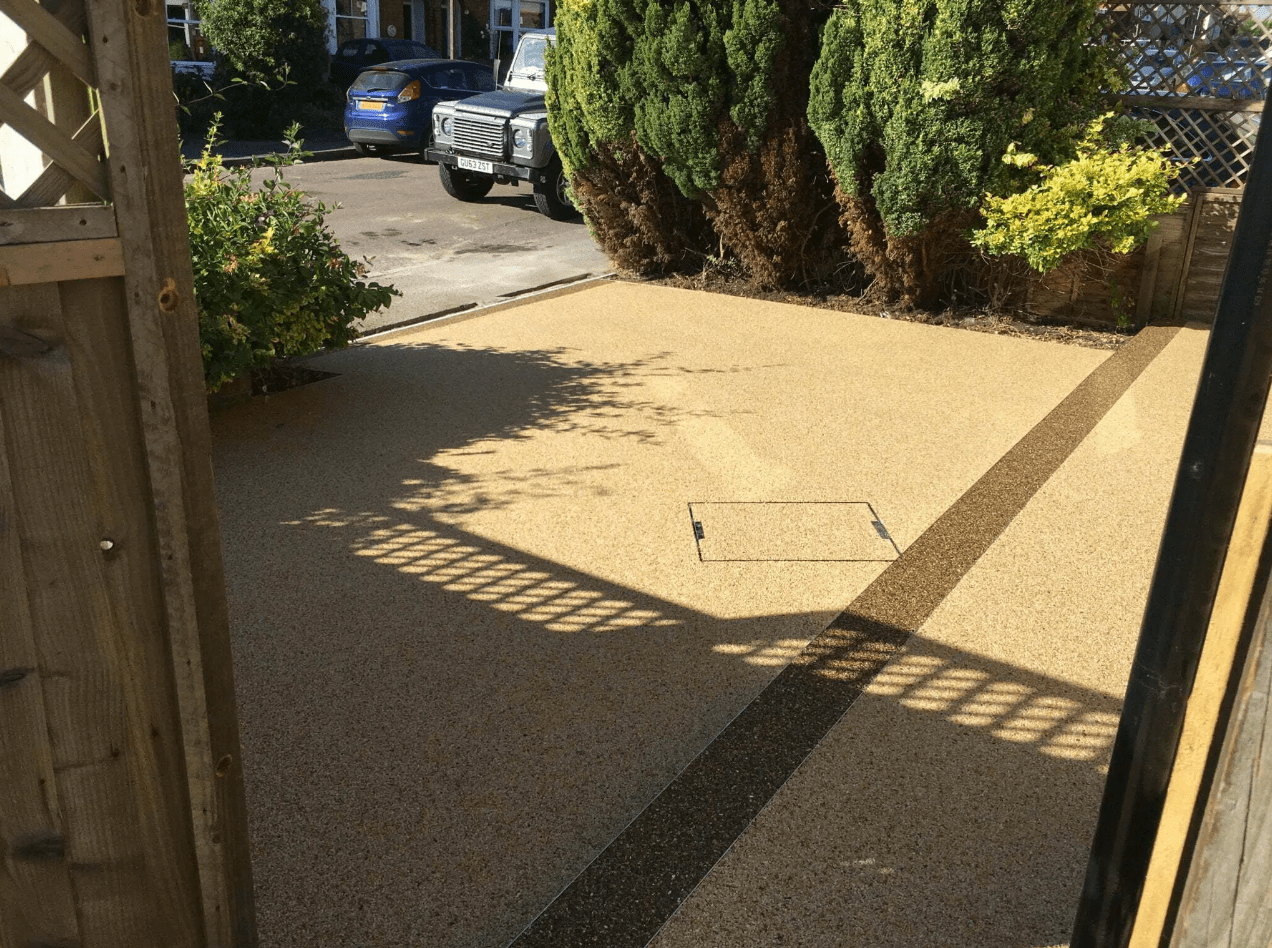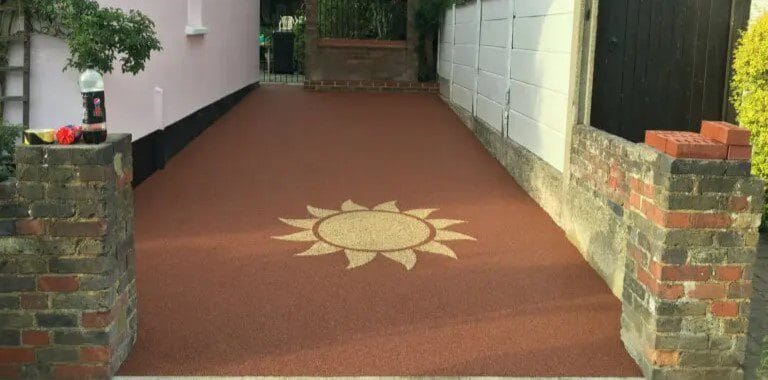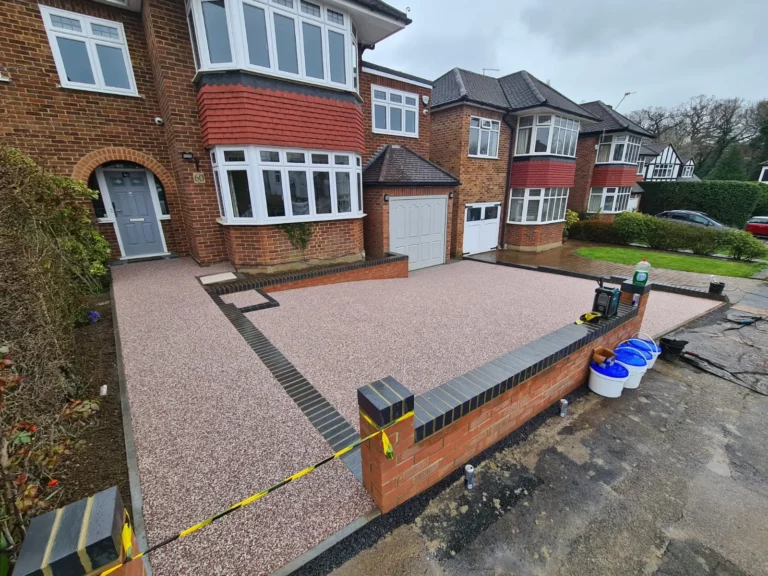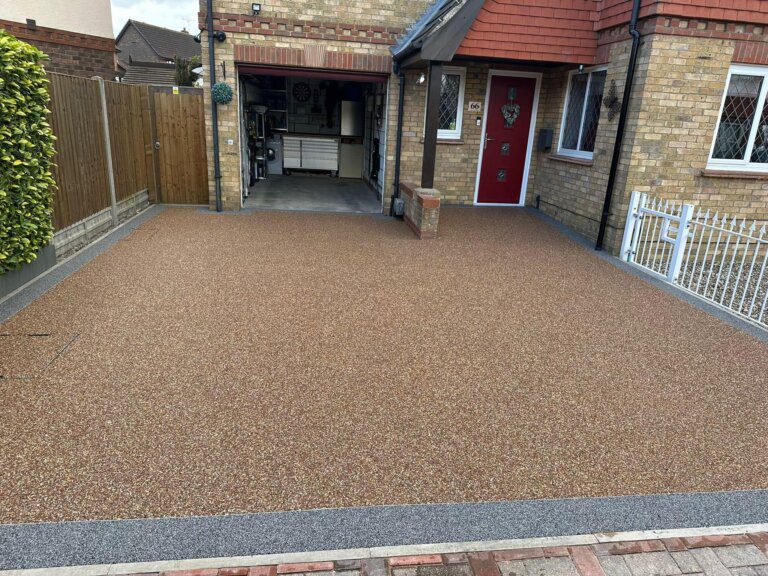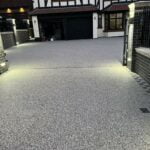Resin driveways typically last between 15 to 25 years. Their lifespan depends on installation quality and maintenance.
Resin driveways have become a popular choice for homeowners due to their durability and aesthetic appeal. They offer a smooth and attractive finish that enhances curb appeal. Proper installation and regular maintenance can extend their lifespan significantly. These driveways are also resistant to UV rays, which prevents fading and discoloration.
They are permeable, allowing water to drain through, reducing puddles and ice formation. This feature makes them environmentally friendly and compliant with sustainable drainage regulations. Investing in a resin driveway can be a wise decision for those looking to improve their property’s value and appearance while ensuring longevity.
Lifespan Of Resin Driveways
Resin driveways are becoming a popular choice for homeowners because of their durability and aesthetic appeal. But how long do resin driveways last? Understanding the lifespan of resin driveways can help you make an informed decision. This section will cover the key factors that affect their longevity and the typical duration you can expect from a resin driveway.
Factors Affecting Longevity
Several factors influence the lifespan of resin driveways. These include:
- Quality of Materials: High-quality resin and aggregates can extend the life of your driveway.
- Installation Process: Proper installation is crucial. Poor installation can lead to cracks and other issues.
- Sub-base Preparation: A well-prepared sub-base ensures stability and durability.
- Weather Conditions: Extreme weather can affect the resin, causing it to degrade faster.
- Maintenance: Regular cleaning and maintenance can significantly extend the lifespan.
- Usage: Heavy vehicles and frequent use can wear down the surface more quickly.
Let’s break down some of these factors in a table for better understanding:
| Factor | Impact on Longevity |
| Quality of Materials | High-quality materials can last up to 20 years |
| Installation Process | Proper installation can add 5-10 years |
| Sub-base Preparation | A good sub-base can add 5 years |
| Weather Conditions | Extreme weather can reduce lifespan by 5 years |
| Maintenance | Regular maintenance can add up to 5 years |
| Usage | Heavy use can reduce lifespan by 5-10 years |
Typical Duration
The typical duration of a resin driveway depends largely on the factors mentioned above. On average, you can expect a resin driveway to last between 10 to 20 years. With high-quality materials and proper installation, the lifespan can reach the upper end of this range.
Here are some general guidelines:
- Standard Use: For a residential driveway with standard use, you can expect around 15 years.
- Heavy Use: For driveways that see heavy vehicle traffic, the lifespan may be closer to 10 years.
- Excellent Maintenance: With regular cleaning and upkeep, some resin driveways can last up to 20 years.
It’s essential to consider the initial cost versus the long-term benefits. While resin driveways may have a higher upfront cost, their longevity and low maintenance needs can make them a cost-effective solution in the long run.
Regular inspections and timely repairs can also help extend the lifespan of your resin driveway. Addressing small issues before they become significant problems can save you time and money.
Installation Quality
Resin driveways are known for their durability and visual appeal. But how long do they actually last? The installation quality plays a crucial role in determining their lifespan. A well-installed resin driveway can last up to 25 years, but poor installation can significantly reduce its lifespan. This blog post delves into the importance of installation quality, focusing on professional installation and common mistakes to avoid.
Importance Of Professional Installation
Professional installation is vital for the longevity of a resin driveway. Experts have the experience and tools to ensure the job is done right. Here are some reasons why professional installation is essential:
- Proper Base Preparation: Professionals know how to prepare the base, ensuring it is stable and even.
- Correct Resin Mix: The right mix of resin and aggregate is crucial for durability.
- Efficient Application: Experts apply the resin and aggregate evenly, avoiding weak spots.
- Weather Considerations: Professionals understand how weather conditions affect installation and adjust accordingly.
Hiring a professional may seem costly initially, but it saves money in the long run by avoiding repairs and replacements. A well-installed resin driveway not only lasts longer but also looks better and requires less maintenance. Below is a comparison of DIY vs. Professional Installation:
| Aspect | DIY Installation | Professional Installation |
| Base Preparation | Often inadequate | Thorough and precise |
| Resin Mix | May be incorrect | Perfectly balanced |
| Application | Uneven and patchy | Even and smooth |
| Weather Considerations | Often ignored | Properly accounted for |
| Lifespan | 5-10 years | 20-25 years |
Common Installation Mistakes
Even small mistakes during installation can drastically reduce the lifespan of a resin driveway. Here are some common mistakes to avoid:
- Inadequate Base Preparation: Failing to prepare the base properly can lead to cracking and sinking.
- Incorrect Resin Mix: Using the wrong ratio of resin to aggregate weakens the driveway.
- Improper Application: Uneven application can cause weak spots and early wear.
- Ignoring Weather Conditions: Installing in unsuitable weather can affect curing and bonding.
These mistakes can lead to costly repairs and reduce the driveway’s lifespan. It’s essential to understand these pitfalls to ensure a durable and long-lasting resin driveway. Here is a quick list of steps to avoid these mistakes:
- Ensure proper base preparation: Compact and level the base.
- Use the correct resin mix: Follow manufacturer guidelines.
- Apply evenly: Use appropriate tools for a smooth finish.
- Consider weather conditions: Install during optimal weather conditions.
Understanding these common mistakes and ensuring proper installation can help you enjoy a beautiful and durable resin driveway for many years.
Maintenance Practices
Resin driveways are popular for their durability and aesthetic appeal. To ensure they last a long time, proper maintenance is crucial. Here, we outline essential maintenance practices that can extend the lifespan of your resin driveway.
Routine Cleaning
Regular cleaning is key to maintaining the appearance and longevity of a resin driveway. Dirt, debris, and organic matter can accumulate, leading to stains and potential damage. Follow these steps for effective routine cleaning:
- Sweep the driveway weekly to remove leaves, dirt, and debris.
- Hose down the surface to wash away finer particles and dust.
- For stubborn stains, use a mild detergent mixed with water and scrub with a soft brush.
- Avoid harsh chemicals that can damage the resin surface.
For oil stains, apply a degreaser and let it sit for a few minutes before scrubbing. Pressure washing can also be used but ensure the pressure is set to a low setting to avoid damaging the resin. Routine cleaning not only keeps the driveway looking new but also prevents the buildup of materials that can cause long-term damage.
Repairing Damage
Timely repairs are crucial for maintaining the integrity of a resin driveway. Small cracks and chips can expand if left unattended. Follow these steps to repair minor damage:
- Identify the damaged area and clean it thoroughly.
- Mix a small batch of resin and aggregate to match the existing driveway.
- Fill the crack or chip with the resin mixture, ensuring it’s level with the surrounding surface.
- Allow the resin to cure as per the manufacturer’s instructions.
For larger damages, professional repair services may be necessary. Regular inspection helps in identifying issues early. Quick repairs can prevent more significant damage and prolong the driveway’s lifespan.
Here’s a table summarizing common repairs and their solutions:
| Type of Damage | Repair Solution |
| Small Cracks | Fill with resin mixture |
| Chips | Patch with aggregate and resin |
| Large Cracks | Professional repair |
By following these maintenance practices, you can ensure your resin driveway remains in excellent condition for many years.
Environmental Impact
Resin driveways are popular for their durability and aesthetic appeal. But how long do they last? One key factor is their environmental impact. Various environmental conditions can affect the longevity of resin driveways. Understanding these factors helps homeowners make informed decisions.
Weather Conditions
Weather conditions significantly impact the lifespan of resin driveways. Different climates bring unique challenges:
- Extreme cold: Freeze-thaw cycles can cause cracking.
- Heavy rainfall: Excessive water can lead to erosion.
- High humidity: Moisture can weaken the resin bond.
- Intense heat: Prolonged heat can soften the resin.
For instance, in regions with cold winters, repeated freezing and thawing can damage the driveway. Cracks may form, leading to further deterioration over time. In contrast, areas with heavy rainfall face erosion risks. Water can seep into the resin, weakening its structure.
Consider a table to illustrate the impact of different weather conditions:
| Weather Condition | Impact on Resin Driveways |
| Extreme Cold | Cracking due to freeze-thaw cycles |
| Heavy Rainfall | Erosion and weakening of resin bond |
| High Humidity | Moisture weakening the resin |
| Intense Heat | Softening of resin |
Uv Exposure
UV exposure is another crucial factor. Prolonged exposure to sunlight can degrade resin driveways. UV rays cause the resin to break down, leading to discoloration and brittleness. This can shorten the lifespan of your driveway.
Here are some points to consider:
- Discoloration: UV rays can cause fading.
- Brittleness: Sun exposure can make the resin brittle.
- Protective coatings: Some resins come with UV-resistant coatings.
For example, a driveway in a sunny climate will face more UV exposure. This can result in the resin becoming brittle and less flexible. Over time, this brittleness can lead to cracks and other damage.
Consider the following tips to mitigate UV damage:
- Choose a resin with UV-resistant properties.
- Apply a protective coating to shield against UV rays.
- Regular maintenance to check for early signs of UV damage.
Understanding UV exposure helps in selecting the right resin and protective measures, ensuring your driveway lasts longer.
Comparison To Other Driveway Types
Thinking of installing a resin driveway but unsure about its longevity compared to other types? Understanding how long resin driveways last compared to concrete and asphalt can help you make an informed decision. Let’s dive into how resin driveways stack up against concrete and asphalt driveways.
Concrete Driveways
Concrete driveways are known for their durability. They can last between 25 to 30 years if properly maintained. Here’s a quick comparison:
- Durability: Concrete is strong and can withstand heavy loads.
- Maintenance: Requires sealing every few years to prevent cracks and stains.
- Cost: Generally more expensive than asphalt but cheaper than resin.
While concrete driveways are durable, they are prone to cracking due to freeze-thaw cycles. The surface can also become stained from oil spills and other substances.
Resin driveways, in contrast, offer a more flexible surface. This flexibility helps them resist cracking. They also have a lifespan of around 20 to 25 years, which is quite comparable to concrete. Plus, resin driveways are UV-stable and resistant to discoloration.
Asphalt Driveways
Asphalt driveways are another popular option. They usually last between 15 to 20 years with proper maintenance. Here’s what you need to know:
- Durability: Asphalt is less durable than concrete and resin.
- Maintenance: Requires regular sealing, usually every 3 to 5 years.
- Cost: Generally cheaper than both concrete and resin.
Asphalt can become soft in high temperatures, leading to potential damage. It also tends to develop potholes over time. Resin driveways provide a more stable surface that is resistant to high temperatures.
In terms of lifespan, resin driveways outlast asphalt. With lower maintenance requirements and better resistance to weather changes, resin driveways are a durable choice.
Signs Of Wear And Tear
Resin driveways are known for their durability and aesthetic appeal. But over time, even the best resin driveways can show signs of wear and tear. Understanding these signs helps homeowners address issues early, ensuring the longevity of their driveways. Here are some common signs of wear and tear to look out for.
Cracking
Cracks can appear in resin driveways for various reasons. Temperature changes cause the material to expand and contract, leading to stress and cracking. Heavy traffic or the weight of vehicles can also contribute to cracks. Look for the following signs:
- Hairline cracks: These are small and often hard to see but can expand over time.
- Wide cracks: These are more noticeable and can lead to further damage if not repaired.
Cracks can also appear due to poor installation. If the base layer isn’t prepared correctly, it can cause uneven settling and cracking. Tree roots growing under the driveway can also push up and crack the surface.
Regular inspections can help spot these cracks early. Small cracks can be repaired with a resin crack filler. For larger cracks, professional help might be needed. Keeping the driveway clean and free from debris can also prevent further cracking.
Discoloration
Discoloration in resin driveways can occur due to UV exposure. The sun’s rays can cause the resin to fade over time, leading to a dull appearance. Chemical spills, like oil or cleaning agents, can also stain the surface.
Common signs of discoloration include:
- Faded spots: Areas that look lighter than the rest of the driveway.
- Stains: Dark or discolored patches due to spills or leaks.
Using a UV-resistant resin during installation can help minimize fading. Regular cleaning with mild soap and water can remove surface stains. Avoid using harsh chemicals that can cause further discoloration.
In some cases, a resin sealant can be applied to restore the driveway’s original color. This sealant protects the surface from UV rays and stains. For severe discoloration, resurfacing the driveway might be the best option.
Cost Vs Longevity
Resin driveways are gaining popularity in the UK due to their aesthetic appeal and durability. Many homeowners wonder about the balance between cost and longevity. Understanding the initial investment and the long-term value of resin driveways can help make an informed decision.
Initial Investment
The initial investment for a resin driveway can vary based on several factors. Generally, resin driveways are a bit more expensive compared to traditional options like concrete or asphalt.
- Material Costs: High-quality resin and aggregates can cost more than conventional materials.
- Labour Costs: Professional installation is recommended, which adds to the initial expense.
- Preparation Costs: Ground preparation and base laying are crucial and can add to the overall cost.
Here’s a table summarizing the typical costs:
| Expense Type | Estimated Cost (per sq. meter) |
| Materials | £40 – £70 |
| Labour | £30 – £50 |
| Preparation | £20 – £40 |
On average, the total initial investment for a resin driveway ranges between £90 – £160 per square meter. Though this may seem high, the benefits often outweigh the costs in the long run.
Long-term Value
Resin driveways offer excellent long-term value. Their durability and low maintenance make them a cost-effective option over time.
- Durability: Resin driveways can last 15-25 years with proper care.
- Low Maintenance: Minimal upkeep is needed. Simple cleaning and occasional sealing are sufficient.
- Weather Resistance: Resin is resistant to UK weather conditions, reducing repair costs.
Let’s break down the long-term value:
| Factor | Benefit |
| Durability | Lasts 15-25 years |
| Maintenance | Low upkeep costs |
| Weather Resistance | Less prone to damage |
While the initial investment may be high, the long-term savings and benefits make resin driveways a smart choice for many UK homeowners.
Frequently Asked Questions
How Long Do Resin Driveways Last?
Resin driveways typically last 15-20 years with proper care. Longevity depends on factors like usage and climate. Regular maintenance helps extend their lifespan.
What Affects Resin Driveway Lifespan?
Several factors affect resin driveway lifespan, including installation quality, usage, and weather conditions. Regular maintenance and sealing can also impact durability and longevity.
Are Resin Driveways Durable?
Yes, resin driveways are durable and resistant to wear and tear. They can withstand heavy traffic and adverse weather conditions, making them a long-lasting option.
How To Maintain A Resin Driveway?
Maintaining a resin driveway involves regular cleaning and occasional resealing. Remove debris and stains promptly. Inspect for damage and repair small cracks early.
Conclusion
Resin driveways in the UK offer durability and aesthetic appeal. With proper maintenance, they can last up to 25 years. Investing in quality installation and regular upkeep ensures longevity. Considering these factors, resin driveways are a cost-effective and long-lasting option for homeowners.
Choose resin driveways for a beautiful and enduring solution.
Related Post: The Benefits of a Resin Bound Driveway and How to Choose the Right Installation Company

